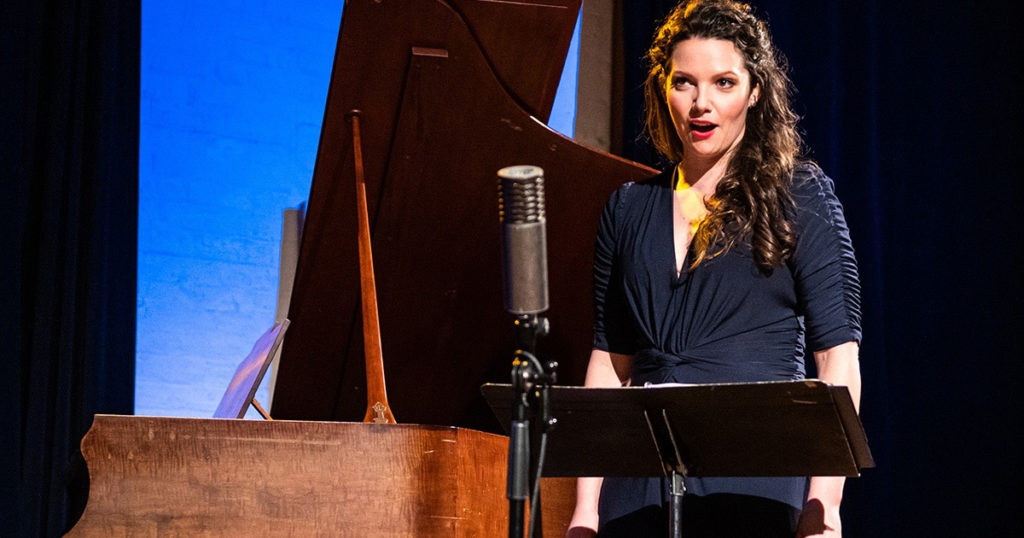Forging forward into 2021, Tapestry Opera has released its latest and arguably most captivating presentation of its current all-digital season, a radiant 60-plus minute YouTube concert, produced in conjunction with Alliance Française Toronto, spotlighting soloist Mireille Asselin in a dazzling spectrum of Canadien-Canadian song and music. Effortlessly flashing back and forth across multiple prismatic cultural interfaces, the internationally acclaimed soprano, born in Ottawa, middle childhood years lived in New Brunswick, embarks on an unexpectedly emotional evocation of her rich Franco-Ontarian/Québecois/Acadian musical heritage, joyful and vivacious, wistful, wishful and poignant.
Playing with tireless sensitivity and refinement, collaborative pianist Frédéric Lacroix partners, the highly illustrative program falling into two loosely structured halves, each singularly appealing in its own distinct way, entirely rewarding when consumed as a whole. Several brief interviews with key contributors — guest artist Acadian guitarist Maxim Cormier and Métis composer Ian Cusson included — punctuate the proceedings, an embedded commentary track of sorts hosted by Tapestry Opera director Michael Hidetoshi Mori and, more frequently, by Asselin herself.
Various selections from five encompassing works provide the framework for Part I, a largely upbeat celebration of Francophone joie de vivre. Wit and high spirits tumble from Lacroix’s keyboard, Asselin impish and effervescent. Anglicismes, extracted from Montreal melodist José Evangélista’s colourful 19-part Exercices de style, essentially sets the tone for what proves to be a generally snappy round of light-heartedness. Un day vers midday, je take le bus et see un jeune man avec une great neck et un hat avec une kinda de laisse tressée. Language and frivolity collide.
The traditional and the historic are present here, too. Les Cormier, Gervais and Maxim, père et fils, rock the landmark Fortress of Louisbourg in a rollicking, pre-recorded salute to the strength and adaptability of Acadian culture. Folk guitars dancing in close harmony, fingers flying across bouncing strings, the breathless pulse of the Scots and Irish-flavoured jigs so loved by the local French population past and present fills the citadel’s candlelit chapel with sheer heavenly joy.
A splendidly riotous excursion into the realm of found poetry and rhythm, Berceuses en 4 cahiers Canada, set to music of boundless playfulness and originality by Quebecois composer/drummer/arranger Félix-Antoine Coutu, brings round one of Asselin’s heartfelt online recital to a uniquely tumultuous, if somewhat cryptic close. Taking as his source of inspiration his partner’s treasured collection of Hilroy notebooks from childhood — Jaune, Vert, Bleu, Rouge — each filled with drawings, favourite letters of the alphabet, stray words, Coutu refashions the contents into a rambling, often potent rush of freeform text overlaid with make-believe. PPPP… Papa. Poule. Pluie. Paul a peur de la poule. Or more dramatically : La licorne est le premier cheval sure la terre./Si la terre est grosse/ Je suis tres petite. A fanciful piece, certainly. Whimsical and fluid. Yet vaguely disconcerting, as well, a bridge to the more melancholic, contemplative air of Song D’Hiver Part II.
Four additional composers are summoned to complete the line-up.
Lacroix’s 8-part Wednesday Night Haiku touchingly preserves a series of once-in-a-lifetime experiences as a vocal teacher, precious moments when students, Asselin included, soared free. Written in 2003, each of eight discrete, intensely compact stanzas speaks to a different singer, a way of paying his good fortune gently, humbly forwards as mentor and coach. Jour après jour/Tombe une fine pluie/Et l’homme vieillit. Inexpressibly touching, piano and vocalist supremely reconciled.
Widening the literary field of vision to include Dylan Thomas, Ottawa-based composer/choral director/high school friend Marie-Claire Saindon gifts Asselin with a particularly moving setting of the troubled Welsh poet’s Do Not Go Gentle. There is nothing overtly metamorphic, nothing linguistically transformative at work here, only the blaze of shared humanity reflected in the singer-actor’s eyes.
There is an unmistakeable theatricality to Asselin’s small screen presence, an uncanny ability to embody repertoire, to project the inner self outwards, to command the moment with a look, qualities well-suited not only to Saindon’s taut, deeply introspective score but also to the work that follows. Ian Cusson’s hommage to early 20th century French-Canadian symbolist icon Émile Nelligan ripples with darkness and discordance. Death stalks the shadows between his words. Asselin and Lacroix lean heavily on one another for musical support. Familiarity and trust factor prominently. Banquet macabre. Confession nocturne. Nelligan’s poetry is hauntingly manifested.
Two pieces, La pastoura als camps and the classic Baïlèro plucked from Joseph Canteloube’s rustic cycle, Chants d’Auvergne written in Occitan, the original language of the region, conclude the proceedings. And bring us full circle via a common place of origin in southwestern France for many Acadians. The synergy is charming. As is the singing.
Closing credits come too quickly.
Our Song D’Hiver is the sort of exceedingly rare concert event that generates its own creative gravity. To resist being drawn deeper and deeper into Mireille Asselin’s extraordinarily expressive world is futile. Her artistry is irresistible.


